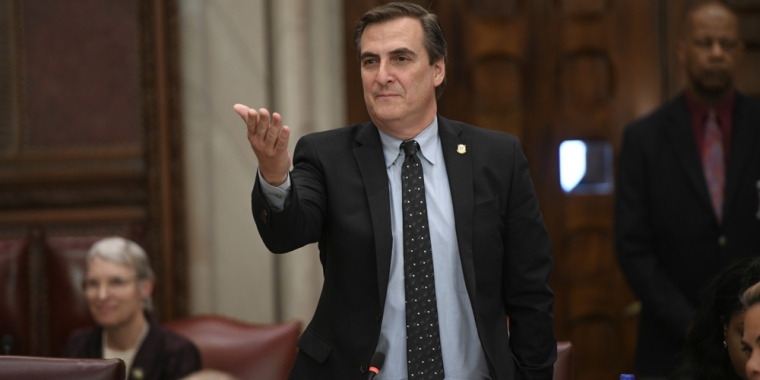
Gothamist: No, NY won’t be taxing the forgiven debt on your federal student loans

Those with student debt in New York can rest easy: The state won’t be taxing the up-to-$20,000 in forgiven loans federal borrowers can receive under the Biden administration’s recently announced plan.
The state Department of Taxation and Finance confirmed to Gothamist on Monday that it will not count the forgiven loans as income, meaning they won’t be subject to the state’s income tax — which could have left borrowers with a bill of several hundred dollars, depending on how much money they currently make.
The only way that would change, according to the tax department, is if the state Legislature were to step in and require the money to be taxed. Such a move appears unlikely: Senate Deputy Majority Leader Michael Gianaris and state Sen. Brad Holyman told Gothamist they intend to soon introduce a bill codifying that the forgiven loans are not taxable in New York.
“The last thing we want to do is eat into people's benefit and require them to dip into their pockets to actually pay,” said Gianaris, a Queens Democrat.
Last week, President Joe Biden announced his plan to cancel a portion of student loans, allowing those making up to $125,000 annually — or $250,000 for married couples — to have up to $10,000 in debt wiped out. (The number rises to $20,000 for Pell grant recipients.)
Those seeking to take advantage of the plan will have to apply. The U.S. Department of Education expects to release applications by October. The deadline to receive relief is on November 15th. Borrowers looking to apply can sign up for notifications here.
The forgiven portions of those loans are exempt from federal income tax under a provision in the 2021 American Rescue Plan Act — the third COVID stimulus package — that Senate Majority Leader Chuck Schumer took credit for inserting. That provision exempts forgiven student loans from being counted as income through 2025.
But there was some initial confusion over whether New York would follow suit and exempt the loans from state tax, as well. The Tax Foundation, a Washington-based think tank focused on tax policy, listed New York as one of 13 states that could potentially levy a tax, with some caveats.
A spokesperson for the state tax department, however, put that to rest in a statement to Gothamist on Monday.
New York is a “conforming state,” according to Darren Dopp, the agency spokesperson. That means the state’s tax policy mirrors federal policy, unless state lawmakers and the governor step in to “decouple” a particular measure.
The state actually did decouple itself from the federal policy exempting forgiven loans as income for the 2021 tax year, according to Dopp. But the state remains coupled to the policy for 2022 through 2025 — so long as state lawmakers don’t reverse it.
“(The) income imputed from this loan forgiveness will not be taxable unless the state affirmatively decides to tax it,” Dopp said.
Calculating how much those with student debt would have had to pay in state taxes would have depended on their income level and the amount of their forgiven loans. But the Tax Foundation estimated the bill could have been upwards of $685 in New York, though it could have been more in certain, rare situations.
Hoylman, a Manhattan Democrat, said he hopes to ensure the legislation he will introduce with Gianaris applies to potential future loan-forgiveness programs as well. Some on the progressive left have been pushing Biden to do more with student debt — with some pushing to cancel it altogether.
“It would be insult to injury to have this federal program actually provide relief, and then tax that relief for the benefit of New York state, which was never anyone's intention,” Hoylman said.


